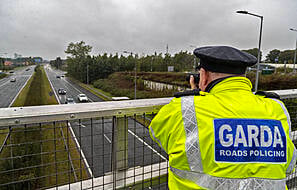The proposed permanent pedestrianisation of a street in Malahide village, north Dublin, is the target of a new High Court action.
Fingal County Council’s plan for public realm enhancements to New Street, including upgraded surfaces with outdoor dining areas, street furniture and cycle stands, was passed by 22 votes to nine with five abstentions last January 16th after a lengthy debate about the merits of pedestrianisation.
Nicola Byrne, a company director who lives on Old Street, Malahide, has secured permission to progress her High Court action alleging the decision to permanently pedestrianise the road is invalid for various legal reasons, including that there is allegedly no local area plan for the village.
This is her second legal case taken over proposals for New Street.
Her 2021 proceedings ask the High Court to quash Fingal County Council’s earlier decision to temporarily pedestrianise the route.
The court refused to grant her a temporary pre-trial injunction in August 2021 that would have prevented pedestrianisation and traffic diversions pending determination of her wider case.
That 2021 action, which remains before the court, alleges pedestrianisation has created traffic issues in the area and more anti-social behaviour.
Her latest case, aimed at the permanent plan, came before Mr Justice Richard Humphreys on Monday.
He was asked by Fingal County Council, through its barrister Aoife Carroll, to schedule for the matter to be mentioned in June, when she hopes it will be ready to secure a date for hearing.
Her client is “anxious” to progress its “important public realm works” that relate to more than just pedestrianisation, she said.
The judge adjourned the case to next week after hearing the State and An Bord Pleanála want to consider their responses.
Ms Byrne, represented by barrister Alan Doyle, instructed by MK Solicitors, claims Fingal County Council’s chief executive legally erred by allegedly failing to consider issues relating to proper planning and sustainable development of the area.
He should have examined the effects of the proposed development when taken together with previous public realm developments, she argues.
Further, she says, the council’s move to adopt the plan is invalid by virtue of it being based on a decision of An Bord Pleanála that she alleges is itself invalid because of how it made decisions about environmental screening requirements.
The planning board also made legal errors by failing to consider the cumulative effects on public health– by way of risks associated with traffic hazard– arising from this project in conjunction with the development of a nearby car park, refurbishment of a green and a greenway that will bring up to 3,500 cyclists on days during the peak season, she claims.
She claims traffic diverted from New Street under the 2021 temporary pedestrianisation uses the same alignment as cyclists.
The decisions of the council and board are further undermined because they authorise a discharge to water that has not been subject to the correct environmental assessments, she claims.
The claims are denied.







